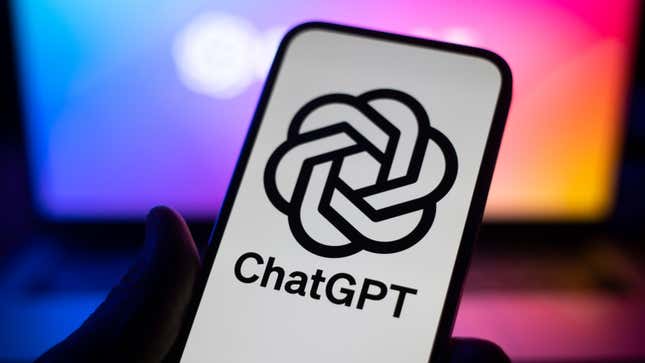ARTICLE AD

Photo: Jaap Arriens/NurPhoto (Getty Images)
There’s so much talk about AI and ChatGPT these days, but what is it really good for? If you’ve been struggling to figure out how to actually use AI in your everyday life, you’re not alone. Many of us are feeling lost about AI, but the practical use cases of ChatGPT are not as obvious as you might think. These magical AI chatbots are supposed to be taking our jobs and rapidly improving the world, but do you even really trust them to write an email?
The key to actually using ChatGPT in your real life is knowing what tasks to use it for, and more importantly, what not to use it for. A general rule of thumb is to automate small tasks that are relatively low-stakes. This can free you up to think about more impactful decisions. You want AI to actually help you with your life, not make it more stressful.
You shouldn’t trust an AI chatbot with a task that’s too important to your career. Writing a sensitive email, creating a pitch to present to your boss, or making a consequential career choice may be too much for ChatGPT. However, it can be helpful for the early stages of work, and getting the ball rolling.
Likewise, you shouldn’t use ChatGPT to do any tasks that are too personal. This includes writing a letter to a loved one, consoling a struggling friend, or other tasks where your personal humanity is an important feature. For those, I’d say it’s better to just do it yourself. However, that’s not to say that AI can’t help at all.
That being said, there are several parts of your life that AI could be helping you out with. Here are 10 practical ways that ChatGPT, or any AI chatbot, can improve your life.

Photo: fizkes (Shutterstock)
If you’re anything like me, you’re horrible at gift-giving. If every birthday or anniversary is your personal waking nightmare, then ChatGPT can help you out. You can tell the AI chatbot, “Help me pick out a gift for my mom who loves gardening,” or “Help me choose an activity-based gift for my friend who loves the outdoors.”
ChatGPT excels at idea generation when your brain hits a wall. It gives you a solid list of ideas that you can narrow down from. AI is really a tool to help you produce something great, but it does require your executive decision-making.

Photo: pathdoc (Shutterstock)
We all have those questions that sound so dumb that we’re too afraid to ask a real person. AI Chatbots are great for this, and can often be much faster than just Googling your questions. Specifically, ChatGPT is great for follow-up questions – when you want to dive deeper into a niche topic.
Perhaps you’re wondering, “How do air conditioners work?” or something you fear may be common knowledge. Perhaps you also want hyper-specific answers about how it works, including follow-up questions such as, “How does the chemical that cools the air never run out?” ChatGPT is great for queries like this.

Photo: Shutterstock
One of the best use cases of ChatGPT is for getting the ball rolling on a work project. Sometimes, you can just be stumped about where to start. AI can be an amazing tool to give you a starting point. Say you work on a school board, and you want to come up with new initiatives to get kids outside after school.
The process of coming up with a list of initial ideas to choose from can be taxing, so you might only come up with a handful few ideas. You could be leaving great ideas on the table, however. Using ChatGPT, you can ask the AI to give you a large list of ideas, then you use your human judgment to choose the best one.
This is a recurring theme throughout this slideshow. Treat AI as an assistant, and treat yourself as the boss.

Photo: siamionau pavel (Shutterstock)
If you’re not a natural romantic, AI can be a great tool for planning something special with your partner. Before you dismiss this altogether, ChatGPT can likely come up with some pretty great date ideas you never would have thought of on your own. The best way to go about this is to tell the chatbot things you and your partner both enjoy. It can be a great way to switch it up and come up with an activity you never would have thought of on your own.

Screenshot: YouTube/Lex Fridman
Sometimes, there is just too much content out there, but you want to stay up to date on the latest news. ChatGPT can be a great way to summarize podcasts that you don’t have time for. Say you want to learn more about hedge fund manager Bill Ackman’s recent appearance on Lex Fridman’s podcast, but you don’t have the time to watch the 3.5-hour interview (who does).
You can simply ask ChatGPT, “What did Bill Ackman discuss on Lex Fridman’s podcast?” It will give you a high-level overview of their topics, and then you can ask deeper questions about any specific topics that interest you. It will even give you time stamps to jump to, so you can skip over topics you’re not interested in. And don’t worry, this will work for most podcasts, not just Lex Fridman.

Photo: DronG (Shutterstock)
Sometimes, I get home from work and my brain is simply empty from the long day. I have no extra mental energy to come up with dinner, but no extra money to order out. ChatGPT is actually a great tool for figuring out what to do with the random ingredients in your fridge. You can just enter, “What’s a quick dinner I can make with eggs, miso, carrots, and bok choy,” or whatever you have in your fridge.
ChatGPT gave me a recipe for vegetable miso soup with poached eggs. It laid out detailed instructions from start to finish, optional extra ingredients to throw in, and even told me how long it would all take. I find this to be a brilliant feature, that is genuinely a lifesaver at the end of long days.

Photo: Jacob Lund (Shutterstock)
We don’t all have the luxury of getting a personal trainer, but with ChatGPT, you can have the next best thing. AI will give you a solid, customized workout plan to your preferences that can help you achieve your goals. Oftentimes, the hardest part about consistently working out is just creating a regimen that you can follow.
You can tell ChatGPT, “Give me a strength training workout plan that involves 3 days a week of workouts, that will help me build my arms and back.” The AI chatbot will produce something pretty solid, and you can even ask it to follow the advice of your favorite fitness experts.

Photo: Pressmaster (Shutterstock)
While ChatGPT is certainly not a replacement for a therapist or trusted friend, the AI chatbot can prove helpful in certain situations. We’ve all had friends tell us private details of their relationships and ask us for advice. Sometimes, we might need advice ourselves on what to tell them, without exposing their privacy. ChatGPT can be a great solution for helping in these situations. While I wouldn’t follow an AI chatbot’s advice blindly, it’s a decent second opinion when none other is available.

Photo: fizkes (Shutterstock)
If you’re looking to advance your career, finding a mentor or professional coach can be difficult. ChatGPT offers a decent solution to this problem. Tell the chatbot “I’m looking to increase my network in the engineering field” or other specific prompts detailing your career goals. ChatGPT will even review your resume, and tell you how it stacks up to other people in your field. While it’s like not a perfect career coach, it’s better than nothing. It can give you some great ideas, and a good place to start.

Photo: Evgeny Atamanenko (Shutterstock)
We all have those projects outside of work we’d really love to get involved with, but we just don’t know where to start. ChatGPT can be a great guide to getting started. Say you want to start brewing kombucha at home or start building birdhouses. There’s a lot of initial information and tools you need to acquire before you can get going. ChatGPT is a very direct, efficient way to get this information. It’s like using Google search, but it can answer your hyper-specific questions, and point you in the right direction of reliable resources.
The best way to think about ChatGPT, or any of the AI chatbots, is as an assistant. If you had a personal assistant in real life, how would you use them to help you achieve your goals? You wouldn’t ask them to make decisions for you, but they might help you get organized and get the ball rolling on certain tasks.

 11 months ago
46
11 months ago
46 

